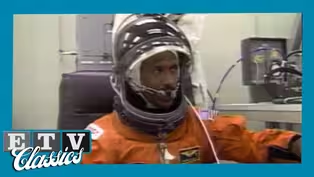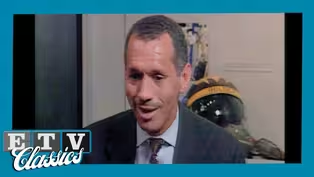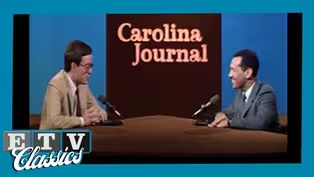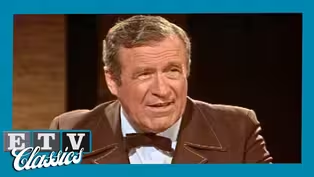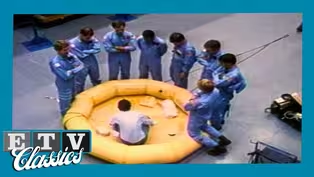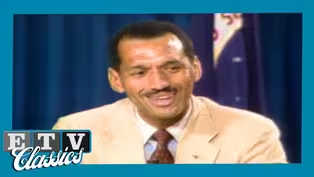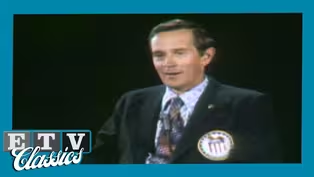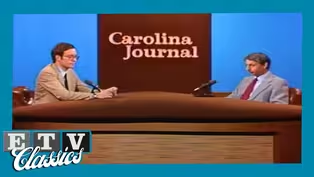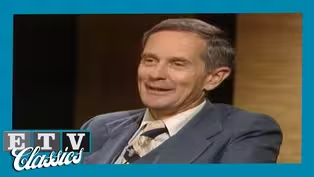ETV Classics
Brigadier General Charles Bolden Jr. | Xpress (2003)
Season 14 Episode 6 | 26m 45sVideo has Closed Captions
An interview with former NASA administrator and astronaut Charles Bolden.
This informative episode of Xpress features an interview with former NASA administrator and astronaut Charles Bolden, including questions from students about his career and advice on becoming an astronaut.
Problems playing video? | Closed Captioning Feedback
Problems playing video? | Closed Captioning Feedback
ETV Classics is a local public television program presented by SCETV
Support for this program is provided by The ETV Endowment of South Carolina.
ETV Classics
Brigadier General Charles Bolden Jr. | Xpress (2003)
Season 14 Episode 6 | 26m 45sVideo has Closed Captions
This informative episode of Xpress features an interview with former NASA administrator and astronaut Charles Bolden, including questions from students about his career and advice on becoming an astronaut.
Problems playing video? | Closed Captioning Feedback
How to Watch ETV Classics
ETV Classics is available to stream on pbs.org and the free PBS App, available on iPhone, Apple TV, Android TV, Android smartphones, Amazon Fire TV, Amazon Fire Tablet, Roku, Samsung Smart TV, and Vizio.
Providing Support for PBS.org
Learn Moreabout PBS online sponsorshipMore from This Collection
South Carolina is home to astronauts Charles Duke, Ronald McNair, and Charles Bolden Jr.
South Carolina in the Space Age | Palmetto Specials (1991)
Video has Closed Captions
A look back at the experiences of Charles F. Bolden Jr. and his rise to becoming an astronaut. (18m 50s)
Conversations with Scientists and Astronauts: Charles Bolden, Part 1 (1998)
Video has Closed Captions
Learn alongside students as they ask astronaut Charles F. Bolden Jr. questions. (19m 1s)
Colonel Charles Bolden: Aftermath of the Challenger | Carolina Journal (1986)
Video has Closed Captions
Colonel Charles Bolden offers a candid reflection on the space shuttle 'Challenger' disaster. (27m 50s)
Space Shuttle: Delays & Possibilities for the Future with Dr. LeConte Cathey | Open Line (1981)
Video has Closed Captions
Dr. LeConte Cathey discusses satellites, the space shuttle, and maintaining technology for space. (28m 47s)
South Carolina Astronauts | Venture (1986)
Video has Closed Captions
Learn more about the firsthand experiences of astronauts Charles Duke and Charles Bolden Jr. (6m 51s)
Profile: Charles F. Bolden Jr. | Carolina Journal (1986)
Video has Closed Captions
A special look at the extraordinary legacy and life journey of astronaut Charles Bolden. (58m 59s)
Kennedy Space Center: Apollo 16 Launch | Nine30 (1972)
Video has Closed Captions
An in-depth look at the launch of Apollo 16 as well as the legacy of the Kennedy Space Center. (30m 6s)
Journalist in Space | Carolina Journal (1986)
Video has Closed Captions
Host Tom Fowler interviews Jack Bass, a member of NASA’s Journalist-In Space project. (27m 52s)
General Charles Duke | Open Line (1983)
Video has Closed Captions
Host Tom Fowler interviews Apollo 16 astronaut Charles Duke about his career with NASA. (28m 50s)
Shuttle Challenger Accident | Carolina Journal (1986)
Video has Closed Captions
Host Tom Fowler brings the breaking news about the Space Shuttle Challenger to South Carolina. (29m 38s)
Providing Support for PBS.org
Learn Moreabout PBS online sponsorshipLinda Durant> Good morning and welcome to "Xpress."
We're live here at the South Carolina State Fair and have we got a treat for you.
Our special guest is General Charles Bolden Who is one of the favorite sons of South Carolina.
In fact, he grew up right here in Columbia, South Carolina, and we're going to be talking with him in a minute about his adventures in outer space, how it was to grow up in South Carolina and a lot of other very interesting things.
So stay with us.
[ ♪ theme music ] ♪ ♪ ♪ Linda> Good morning, again.
Boy, what an exciting day this is.
We have with us General Charles Bolden, who is a former astronaut.
He retired from the military.
You said January 1st.
Gen. Charles Bolden> January 1st of this year.
Linda> How many years did you have in the military?
Gen. Bolden> At the time of my retirement, I had been in for 34 and a half years.
Linda> Oh, and you were a marine?
Gen. Bolden> I'm still a marine.
<Oh!> As a matter of fact.
Linda> Once a marine, always a marine.
Gen. Bolden> That's correct.
Linda> Absolutely.
Semper fi.
Gen. Bolden> Yeah.
Thank you.
Linda> All right.
And we're excited to have him with us, to talk.
We have some students with us this morning, and they are a flight of the C.A.
Johnson Junior ROTC group.
We're so delighted to have you with us.
Their colonel is Colonel Walter Watson, and the assistant principal is Terrence Martin.
They are with us, as well, and they're going to ask a few questions.
But you know, General, we have when we put out the word that you were coming, we said we can ask some questions by e-mail.
We have over 350 questions, and we're going to be able to ask just a few today.
So, why don't we get started.
<Okay.> First of all, Dana from Orangeburg asked, "did you like growing up in South Carolina?"
What was the first job you had, and where do you live now?
Gen. Bolden> Wow!
I really enjoyed growing up in South Carolina.
I was actually born and raised here.
In fact, my home of growth is still right there on Barhamville Road down the street from C.A.
Johnson High School.
I tell people it was great because I walked to elementary school, walked to junior high school walked to high school.
My first job was working at the pool at Drew Park swimming pool.
I was a basket boy <Oh!> in the locker room.
I handed out baskets and put clothes up.
Then eventually became a lifeguard.
Where do I live now?
I live now in Houston, Texas.
Linda> Are you still interested with the space center there?
Gen. Bolden> I'm...on the periphery associated with the space center.
I'm now the senior vice president of a company called Tech Trans International.
We're a language company.
We teach languages, do interpretation and translation, and my company trains all the American astronauts to speak Russian, Russian cosmonauts over in Moscow to speak English, and then we provide all the space-to-ground interpretation for people both in Moscow and here in the United States.
Linda> That's fascinating, and that is seeing a niche market, and filling it.
Gen. Bolden> It is, very much so.
Linda> Okay.
I got another question from Amanda in the fourth grade at Dutch Fork Elementary and also from Dante in Dillon.
What was your favorite teacher and why?
What was the name of the school?
Gen. Bolden> I guess I would have to say Ms. Mary Ray Saxon Jackson from C.A.
Johnson.
She was my Latin teacher.
Linda> Wow!
Is she still there?
Gen. Bolden> Oh, no.
She passed a number of years ago, but she taught my father and taught me.
She was a legend here in Richland School District.
Linda> As a child, now this comes from Dominique at Colleton County High School.
As a child, what were the influences that made you want to enter a career involving space?
Gen. Bolden> I did not have an interest in space as a child, interestingly enough.
My coming out of W.A.
Perry, I decided I wanted to go to the Naval Academy.
So, I knew that, but I was all over the map in terms of what I wanted to do when I grew up.
I wasn't as fortunate as many of the young people in the audience here and in the viewing audience who know what they want to do.
I didn't decide what I wanted to do until my senior year at the Naval Academy to be quite honest.
Linda> Well, you know, I was looking at your bio, and I realized that I'm exactly 23 days older than you, and if you were like me, a lot of the fields that are open to these young people today were not open to us when we were coming along.
Gen. Bolden> That's exactly right.
As a matter of fact, growing up in South Carolina, back in the segregated south, there were a number of things that you never even thought about, because they just, as you said, they weren't open.
Being an astronaut was not something that I considered possible because at that time, astronauts were all White Anglo-Saxon Protestant, about 5 feet 10 and they were military test pilots, and I was none of those going through school here.
Linda> Where did you go to college?
Gen. Bolden> I went to the United States Naval Academy in Annapolis, Maryland.
Linda> That was from Sequoia and Gabriel in Dillon.
What subject did you like best when you were in the fifth grade?
Gen. Bolden> I always liked math and science.
It's kind of hard to say whether I liked the math or the science better, but in fifth grade, probably math back then and then kind of went back and forth.
When I went to junior high school, from junior high school on, I participated in science fairs every year.
I always liked math and science.
Linda> What education did you have to have to become an astronaut?
This is from Mrs. Ledsburg's class in Fort Dorchester High School.
Gen. Bolden> I will tell them the same thing I tell everybody, education is critical.
Math and science are essential.
But you have to take everything that's offered.
You've got to have a relatively well-rounded background academically.
Math and science again are critical, but the liberal arts, English, literature, history, I think is most important, especially for young kids of color, it's critical because we need to understand where we came from so we know where we want to go.
If you don't, you're lost.
Linda> A good question here from Joseph at Fort Dorchester High.
Did you have a mentor?
Gen. Bolden> Oh, I had numbers of mentors.
I already mentioned Mrs. Mary Ray Saxon-Jackson as a teacher.
My father was probably my ultimate mentor.
I grew up watching him coach football at C.A.
Johnson, followed the football team around.
He let me be the water boy and all that.
Then the person who became a mentor later was Major John Riley Love who was another Marine.
He's the reason I'm a Marine.
He was my first company officer at the Naval Academy.
Linda> Okay, this is a good question, too, and I think you said... Did you always want to become an astronaut, or did fate just lead you to the profession?
Gen. Bolden> Fate kind of led me to the profession.
I did not.
I never dreamed of being an astronaut.
I left C.A.
Johnson to go to the Naval Academy to become a frog man, to become an underwater demolitions team member, a S.E.A.L., and found out that for various reasons, you couldn't do that out of the Naval Academy.
Thought about everything, but really didn't think about flying.
Didn't think about the Marine Corps initially, and then my fourth year at the Naval Academy, decided I was going to be a Marine.
Subsequently, decided I was going to fly.
And a long time later decided I was interested in the space program.
Linda> And took advantage of being able to move in.
Gen. Bolden> The thing that stood me in good stead was my academic background, again my interest in science and math from junior high on.
So, when I, as I changed my mind as to what I wanted to do, I had the requisite qualifications to do that.
That's why I recommend to students that they've got to study.
They've got to study very diligently.
Take the math and science, but don't forget the other things also.
Linda> I had a question, were you an honor student and this came from, one of the students at Bell Street Middle School.
Gen. Bolden> I was very fortunate, my mom and dad were educators, and they emphasized studying to my brother and me.
I was a member of the junior honor society and the honor society, and I was an honor student when I went to Johnson.
Linda> I know you have young people of your own.
Do you encourage them to follow you in your footsteps, and are you the same type of parent that your mom and dad were?
Gen. Bolden> My wife and I try to be good parents.
We use both of our sets of parents as role models.
We try to do what they did.
My kids are grown now.
Me son is a Major in the United States Marine Corps, much to my -- I'm very proud of him, but much against my advice.
He's a back seater, an F-18 weapons and sensors operator.
My daughter, our daughter is now a first-year resident in general surgery at Emory University Medical Center in Atlanta.
Linda> Wow!
So you have the medical side... Gen. Bolden> We're working on grand kids now.
Linda> Terrific.
Now, you young people may have a question or two.
We're going to get into a little bit of the career.
So, if you've got a question, raise your hand so we can see you and get a microphone to you.
Let's go ahead and begin talking a little bit about going into space.
We, first of all, have, what are the pros and cons of being an astronaut?
This is from Mrs. Ledford's class at Fort Dorchester High.
Gen. Bolden> I can't think of any cons to be an astronaut.
The pros are the thing that took me there was a desire to contribute something to the nation and the world on a higher plain.
It's fun.
It's exciting.
It's challenging.
I can't think of a single day that I went to work that I wasn't excited about going and about what we were going to do.
You know, the only con, if you want to put it that way, it's risky business, but that's life.
Linda> We have a question down here.
Student #1> I want to know what opportunities are available to the youth that contributed to your future success?
Gen. Bolden> What opportunities were available to me?
Everything, as a matter of fact.
I mentioned, even when Columbia and South Carolina, and the rest of the south was segregated, my mom and dad had convinced me that there was never anything I could not do if I set my mind to it.
I had doors opened to me by being given an opportunity to go to the United States Naval Academy.
I think that set me up in terms of what became my long-term career in the Marine Corps.
Opportunities to go study math and science.
I participated in science fairs, just as all of you can do.
There are countless opportunities that you get, and you don't consider opportunities, and you just kind of let them go by.
Anything you want to do, ask somebody.
Yes.
Linda> Okay, we have one coming right over here.
Student #2> How did your 34 years of military training relate with everyday life?
Gen. Bolden> How did my 34 years relate?
I learned my discipline was refined.
My father was a pretty good disciplinarian when I played football for him at C.A.
Johnson.
My mother was a better disciplinarian, believe it or not.
I think the things I learned in my, in my growing up from my teachers at all my schools, C.A.
Johnson, Perry, Carver.
They all kind of came together.
The military didn't teach me anything I didn't already know.
I understood right and wrong.
The military kind of helped to put it in focus.
It gave me opportunities and challenges to do, to make decisions that I didn't have an opportunity to do when I was younger, or decisions that I would not necessarily have made an opportunity to make in the outside world.
Sometimes life and death decisions, you know, what's going to happen to a person or persons.
That's something you get in the military that you don't, you don't always get on the outside.
Linda> Okay, we'll take another question in a minute.
Let me go ahead and, let's ask a couple of these.
They want to know from Dutch Fork Elementary, how long you have been flying the shuttle.
Also, from Bell Street Elementary, is it difficult to drive a space ship?
Was it hard to learn how to drive a space shuttle?
And were you nervous?
Gen. Bolden> Let me start from the beginning.
Yes, I was nervous.
Nervous is a...big word, I was apprehensive.
I don't think I was ever afraid any of the four times I went into space.
I was nervous every single time.
Just as I'm, I'm nervous every time I do anything that's public, speaking, this show.
I think that's good because it makes you think about what you're doing.
Was it difficult to learn?
Very difficult.
In fact, up until six months prior to my first flight, I didn't think I was going to get there, to be quite honest.
The shuttle is a very complex vehicle.
The whole program is very complex, but all of a sudden one day, the light bulb came on, and I learned.
It's, once you learn how to fly it, it's an easy spacecraft or vehicle to fly.
It behaves the way you think it ought to behave.
Linda> What's the difference in flying a military aircraft and flying the shuttle?
Gen. Bolden> The biggest difference between the shuttle and other aircraft I flew, is it goes across the speed ranges, you know, you start out laying on a launch pad and you go to what we call, hypersonic speeds, multiple times the speed of sound, when you're going around Earth, although it's kind of not real, you're going mach 26, so 26 times the speed of sound.
Coming back into the atmosphere, you go through different situations where the flight controls don't respond the way they do on a normal airplane.
They do the opposite, but you learn how to do that.
It behaves similar to a high-performance jet.
Linda> When you go off into space and they start counting down, what's the feeling you get?
This is from Adam in Colleton County and Jenna at Bell Street Middle.
>> I was always nervous.
I slept well the night before launch, but when you get suited up and you get strapped into the vehicle, you have a couple hours to wait it out because you're laying on your back there on a launch pad while they go through all the last-minute checks.
You're nervous, but you review all of your procedures and make sure that if something goes wrong, you know what you're going to do.
My concern was always, did I not do something that would put my crew or vehicle in jeopardy.
Linda> That's a sign of a good leader, right?
Gen. Bolden> ...vital, I think.
Linda> You have a question over here.
Student #3> Who inspired you the most?
Gen. Bolden> Who inspired me the most, if you say overall, probably my father.
Again, he was my principal role model.
My mom, for those of you who ever knew Mrs. Bolden, was an awesome individual.
As a male growing up, you know, I think it's good to have a male role model.
My mother and father were equally inspirational, but my father, probably more than anything else because I saw him through adversity.
He just taught me how to live.
Linda> Okay, we've got about... Gen. Bolden> He taught me how to cry.
Linda> That's important for a man to learn.
Gen. Bolden> That is.
Yeah.
Linda> Yeah.
Yeah.
All right.
We're going to talk about this space ship, this spacesuit, excuse me, space suit.
First of all, why do you wear a spacesuit in space?
How does it help you breathe?
That's from Jackson at Hollywood Elementary.
How does a space suit feel, is it hot?
That's from Megan at Ms.
Weeks' second grade class and Melissa at Lake Murray Elementary.
How much does your space suit weigh?
This is from Holly Hills Elementary.
Gen. Bolden> I'll try to answer all those.
I have to tell you, what I'm telling you about the spacesuit is what I've heard.
I've only worn a launch and entry suit.
We have two different kinds of things in which you fly.
For take off and landing in the shuttle, since the "Challenger" accident, we wear a launch and entry suit, that's very much like your commander used to wear in an SR-71.
It's a partial pressure suit with a helmet and gloves and everything.
It provides a little cocoon for you to survive in if something goes wrong.
The space suit, the big white thing weighs about 300 pounds down here on Earth.
Once you get in space, because you're weightless you're going around Earth so fast, that you become weightless and so it weighs nothing.
It's about 300 pounds Earth weight.
It's very difficult to get into.
The crew members have to squeeze into it on orbit.
It comes in two big parts, so they get into the upper torso first and then pull the legs up and snap at the belt, at the waist.
I'm told that it's very comfortable to be in It's a lot of work though because it's a pressurized suit, and you're actually fighting against the suit just to stretch your hands out, to stretch your arms out.
So, an eight-hour space walk is a lot of work for a space walk crew member.
Linda> Just to get ready to do.
Gen. Bolden> just to get ready to do it, but then they execute it because they're working against the suit all the time.
The launch and entry suit is pretty comfortable.
The neck kind of gets tired after a while because it's got the neck ring that will let air come out but not let water and stuff come in.
That kind of will irritate you a little bit, but you get used to it.
Linda> I have a question here about "Why don't astronauts float off in space and get lost?
This comes from Justin at Hollywood Elementary.
Gen. Bolden> Astronauts could float off in space and get lost except we make them tether themselves.
We make themselves attach themselves to the shuttle, when they go out to do space walk.
It's a safety measure.
So, they're always tethered by this about 100-foot long cord, but they could float away.
Linda> But they could float away if it came undone- Gen. Bolden> - if it broke.
Linda> What was it like in outer space?
This comes from a bunch of people, Dutch Fork Elementary, Barren Academy Elementary, Colleton County High, Bell Street Middle and Lake Murray Elementary.
Gen. Bolden> Space flight is awesome.
The experience there is two-fold.
Just the visual experience is really unbelievable.
You get some of the kids here in the audience can see, but you get the opportunity to see a huge portion of Earth at any given time, so visually, it's exciting and unbelievable.
The physical feeling of being weightless, just the fact that you can, you know, you can just dangle in mid-air and not go anywhere.
Weightlessness does not mean you float to the ceiling, it means you, you abide by Newton's laws.
Unless something bothers you you stay right where you are.
That's a pretty awesome feeling.
<I bet it is.> I overuse the word awesome, but that's... Linda> It has to be awesome.
It just has to be.
Gen. Bolden> But it's much like... any of the kids that wrote into you or are listening can experience something very similar in flight.
Just flying in itself is an invigorating experience, any kind of aircraft, whether it's a civil airplane or a high-performance jet.
Linda> I got another question about what does the food in space taste like?
What do you eat and how do you eat it?
Gen. Bolden> The food in space is delicious.
You pick it and the dietitians prepare it for you.
You actually eat normal foods now a days We dehydrate it partially for storage, but then add a little water to it to make it normal.
Rice, green beans, greens, steak, hot dogs, anything that you can eat down here, we eat in space.
It behaves very well, because even though you're weightless and everything floats, if you don't bump it, it will stay right there in the container.
Liquids don't behave.
You have to drink them and clip off the straw.
They kind of float all over the place, But the foods are very good.
Linda> Good, and do you get to request specific things?
Gen. Bolden> You pick what you want to eat.
You work with the dietitians.
You select your meals, three meals each day for the number of days you're going to fly, and then they pack two extra days of food for you.
Linda> Just in case.
Gen. Bolden>Just in case.
Linda> What's the hardest and best part of the training in preparing for a journey into space?
This comes from Jason at Coosa Elementary and Angela at Colleton High.
Gen. Bolden> I think the hardest part, varies from individual to individual.
For me, getting ready for my first flight, the hardest part was just memorization of all the different systems on the shuttle and what they did.
We make it a special case to try not to do anything by rote memory.
We try to follow procedures all the time, but in order to follow the procedure quickly, you need to know what it means and you have to understand it thoroughly.
For me, I found that to be the most difficult.
Getting good recognition of the systems and the like.
The physical parts of preparation are pretty easy.
Linda> In the book "Mighty Machine Spacecraft," and this is from Carson in the 4th grade at Hollywood Elementary, it says some day astronauts are going to take plants to Mars so there can be life on that planet.
Is this true?
Gen. Bolden> I don't know.
That's a...that's a, I think initially, when we go to Mars or any other planet, we won't take anything because we don't want to pollute that planet with things from Earth.
I think what we will do is, we will find a way to grow plants and other things like that on another planet.
Mars is probably the one to which we're going to go.
I think when we get there, we may find that Mars already has its own kind of plants or it can adopt its own kinds of plants, so we'll adjust to those as opposed to taking something there from Earth.
Linda> We have a question out here.
Student #4> What are the key points to being a leader?
Gen. Bolden> What are the key points to being a leader.
The number one point is to be a follower.
You can't lead if you can't follow.
In the Marine Corps, we really believe that, and so whether you're going through boot camp as an enlisted Marine or through Officer Candidate School or the basic school as a commissioned officer, the very first thing you learn is how to follow.
Once you learn that, I think it's important to learn to be compassionate, believe it or not, to be stern when it's necessary, to be fair because that's imminently important, to be balanced.
I could go on and on and probably the most important thing in leadership is to promote integrity, but to be honest with your people.
If you're not honest, if you don't exemplify integrity, then generally they won't.
That's critical in a military environment.
Linda> Okay, I have a question from Zack in the 4th grade at Westview Elementary.
What were some of your coolest experiences in space?
Gen. Bolden> What are some of my coolest experiences?
Well, all of them, but Zack, I tell ya', floating in space and the coolest were the fun times.
Floating in space, taking M&Ms and passing them from one crew member to the other and then you know trying to move your head around and catch it in your mouth without putting your hands on it.
Those are silly but very cool.
<Popcorn> That's probably the most fun.
Linda> Okay, we've got about four minutes, there's a young lady here with a question.
Student #5> What tips or advice would you give to a person in regards to preparing to be an astronaut?
Gen. Bolden> Oh, in preparing to be an astronaut it starts right now.
So I would say forget about being an astronaut.
Focus on being a student.
Focus on being a good student Really study hard, in whatever environment you happen to be whether it's elementary school junior high school, high school, college, or graduate school.
Take tough courses, math and science, take all you can Take a balance of courses Make sure you mix some liberal arts.
Make sure that you do some things outside of school, extracurricular activities, the junior ROTC, like you all are participating in are excellent.
Do community services, type activities, get to the point where you understand that you're not the most important person in the world, that your contributions are the real critical things.
I think if you'll do those, you'll be okay and then years later, think about being an astronaut, but get being a good human being down first.
Linda> I've got a question down here that I think is real important.
It's from the second and third graders, at the South Carolina School for the Deaf.
They want to know what happened to the space shuttle.
We were very sad, and we want to learn more about space.
We like Saturn, Earth, and Mars the best.
>> Those are some of my favorite people as a matter of fact, up at the South Carolina school for the Deaf.
I actually got an opportunity to present to them which was the most challenging presentation I've ever made.
When we lost "Challenger," it was very simple.
We made a mistake.
We launched on a morning that we probably shouldn't have launched.
But even worst than that is we had a system in the solid rocket boosters where the material that was supposed to keep extreme heats inside the solid rocket booster wasn't as good as it should have been on Columbia, and I know they didn't ask about it.
Again, we made a mistake.
We probably should have...
In fact, we probably should have, we should have paid more attention to the loss of foam from the external tank and actually repaired that so it didn't happen, and then, you know, other than that, I'm not sure what else we could have done.
Linda> What is the future of the space program?
We only have a minute and a half here.
Gen. Bolden> The future of the space program is whatever you all determine it is.
I wish I could tell you.
I'm an old guy, in relative terms.
I'm not an old person, but in terms of experience, the people who determine the future of America's space program and the space program of the world since everybody follows us are the kids in the audience, those who wrote in questions and those sitting here in the audience.
Whatever they decide we're going to do is what we'll do, because they will have to influence Congress to fund it.
Some of them, one of them will be President of the United States one of these days, and they will have the ultimate decision as to whether we're going to continue manned exploration, human exploration, or whether we're going to give up on it.
The next few years are very critical.
It's important for all of them to be interested.
Linda> I've got one final quick question, I want to ask you, because we only have 45 seconds.
If you were never in the Marines and never joined NASA, what would you have done with your life?
Gen. Bolden> God would have told me.
I don't have a clue.
It would have been like anything else I've done.
I try to listen and I've kind of walked through life listening, so I don't have a clue.
Linda> Well, we want to thank you for taking a minute to be with us this morning.
because I think you're a terrific role model for a lot of young people that are here today.
You have done an awful lot with your life and you took what God gave you and made the best of it that you could.
We've got about 20 seconds.
Anything you want to say?
Gen. Bolden> Go back to the question the young lady asked about opportunities.
You make opportunities.
That's what's critical.
Linda> We thank you all for being with us.
Join us again.
(theme music) ♪ (music fades)
Support for PBS provided by:
ETV Classics is a local public television program presented by SCETV
Support for this program is provided by The ETV Endowment of South Carolina.
